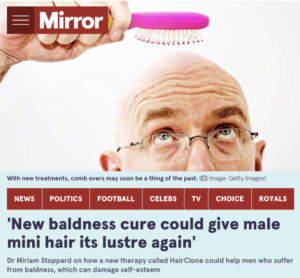On the 12th November 2023, the Mirror published an article about HairClone’s development of a cell therapy for hair regeneration, titled “New baldness cure could give male mini hair its lustre again”. The article discusses HairClone’s progress towards developing a treatment to increase hair thickness and future aims to predict hair loss using genetic markers found in hair follicle cells.
The author, Dr Miriam Stoppard, highlights how hair thinning and pattern baldness has long been a sensitive issue, as it affects as many as 85% of men by the age of 50. Male pattern baldness is caused largely by sensitivity to dihydrotestosterone (DHT), resulting in the loss of dermal papilla cells found at the base of hair follicles that are responsible for the thickness of hair follicles. This causes the appearance of thinning or balding hair, and can result in lowered self esteem or anxiety.
HairClone is currently offering a follicle banking service, which involves extracting around 120 follicles from the donor, and cryopreserving them at -190ºC. Once required, the follicles are thawed and the dermal papilla cells are cloned to generate a vast supply.
Animal studied carried out by other groups have shown that injecting these cells back into the scalp generates the appearance of thickened hair, with dermal papilla cells migrating to fill and rebuild hair follicles. HairClone hopes touse this knowledge to demonstrate effectiveness in clinical trials so a personalised cell therapy can be made available to the public.
The article also discusses the potential for predicting hair loss by analysing genetic markers found in dermal papilla cells. Dr Claire Higgins, lecturer at Imperial College London and scientific advisor to HairClone, commented that “There’s always been this clear pattern of male hair loss, but no one’s really explained why it’s like that”, and that differences in hair loss patterns on the scalp could be a result of different paths taken during development. This could also explain why DHT affects some dermal papilla cells but not others.
HairClone is currently working towards analysing these genetic markers, alongside their personalised cell therapy development, for predicting pattern balding across different regions of the scalp in order to further personalise patient care.

